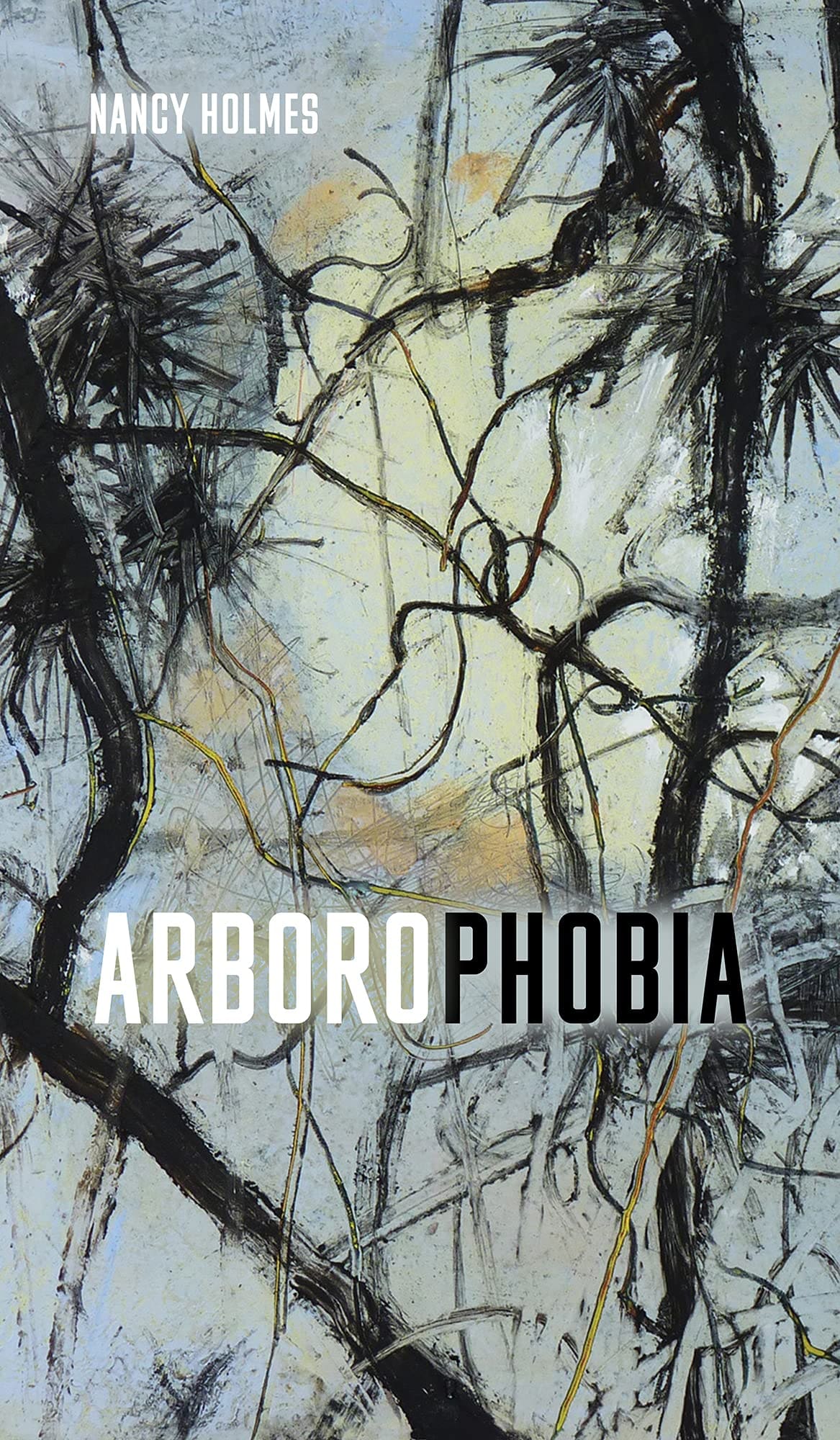Nutlike: a review of Arborophobia by Nancy Holmes
Reviewed by Dawn MacDonald
Arborophobia by Nancy Holmes (University of Alberta Press, 2022)

“Pray inwardly,” the 15th-century Christian mystic Julian of Norwich once advised, “even if you do not enjoy it. It does good, though you feel nothing.”
“Read poetry,” one might respond, “even if you do not understand it. It does good, though you comprehend nothing.”
Okay, so “nothing” is a strong word. The poems that Nancy Holmes offers us in her debut collection, Arborophobia, are lucid, fluent, each piece compact and contained like a hazelnut. (See more below about hazelnuts). Yet one senses a greater substance beneath this brilliant surface that would, if one could bring it sharply into focus, delineate a whole.
Julian of Norwich, the subject of one section of this book, is quoted in the epigraph: “He showed a little thing the quantity of a hazelnut in the palm of my hand, and it was as round as a ball. I looked thereupon with the eye of my understanding, and thought, “What may this be?” And it was answered thus, “It is all that is made.”
The book, nutlike, opens to reveal its pieces, shell and heartmeat, that, in their varied reflections of “what is,” cohere towards that singular all. From an ode dedicated to a milk chute in the opening pages (“obsolete hole boarded up / beneath a renovation”) to the final sequence on “Paths Taken” (“Oh I was a hapless creature / future-blind, present-poor, / and past-pulled.”), Holmes brings us into an extended meditation on the mysterious worm-tunnels that we must travel out of a delapidated history and into an obscure present.
She doesn’t shy away from the quotidian (“Dining and driving, / Dining and driving, / is this how we have spent our lives? / Now where am I going? / Has a new wing been added / to the cafeteria?”). There is humour here as well (“It’s a terrible consolation, / but every day / we are becoming younger / than our dogs.”).
There are moments of great beauty here, tinged ever with sadness, loss, and a sense of sacrifice or seeking absolution. In “Anemone in Cypress”, for example, there’s an allusion to the wheel of samsara, or perhaps to the Catherine Wheel that would have been used for public executions in Julian of Norwich’s time: “This is the flower of the anemone. / A small wheel with delicate spokes. / The bruise of love where the wheel runs over you. / A button on the kid glove of earth. / The buttons and collars / that make you fumble. / The pulse in the throat.”
Nature-themes are prominent, as might be expected from the book’s title, but very much in relation to the constructed world as understood through human abstraction. (The endnotes inform us that “arborophobia” is an architectural term referring to an aesthetic preference for the transformation of landscapes to eliminate trees and other indigenous herbiage). We live in a world of natural wonders, but the wonder is in our intellection and our sense of what communion could mean. Julian of Norwich was an anchoress, choosing a life of religious seclusion living entirely inside a small cell. There she wrote her Revelations of Divine Love, which constitute the oldest surviving works that can be definitely attributed to a woman writing in English (excluding anonymous texts of unknown authorship). Yet, within that small room in the midst of a medieval city, one of her most famous revelations involved not only direct conversation with the person of Jesus but a vision drawn directly from nature: “she locked herself up / and saw all the world / in the seed of a tree.” In explicating this revelation, Julian focused on Divine Love – that God must love his creation, and sustain it in its immensity and minuteness from moment to moment, else all would collapse.
Within the extended “Julian” sequence, Holmes speaks to us of love in its rawness. She sees a figure on the street and asks herself, “is it my child? no / it’s another / another human being / whatever you do, you will have sorrow / inside your heart / you will find at least one / of the four failures of love:”. In the heartrending repetition of “another / another”, in the enumeration of the precise number of ways in which love may fail, we experience what it is to be human in a world of separate beings, to be human in a world where love is both verifiable and uncertain, to attempt to think our way across the abyss.
Aborophobia is an ambitious project and any single reviewer may only lightly scratch the surface of all that’s intended here, and all that may be found by readers entering through the doors of their own histories and concerns. There’s a great deal going on, and much to reward exploration. The book cannot be easily summed up, and that in itself is an excellent thing.
Arborophobia by Nancy Holmes (University of Alberta Press, 2022)
Nancy Holmes is an award-winning poet and editor, and Associate Professor in the Faculty of Creative and Critical Studies at UBC Okanagan. She also collaborates on eco art projects both locally and internationally.
Dawn Macdonald lives in Whitehorse, Yukon, where she was raised off the grid. She holds a degree in applied mathematics, and used to know a lot about infinite series. Her poetry has been nominated for a Pushcart prize, and has recently appeared in Asimov’s Science Fiction, CV2, and elsewhere.
